Overnight care at home
Worried about your loved one’s safety at night? Our compassionate overnight carers are there to provide dedicated support and reassurance, ensuring they can rest soundly in their own home.
Find a carerCall us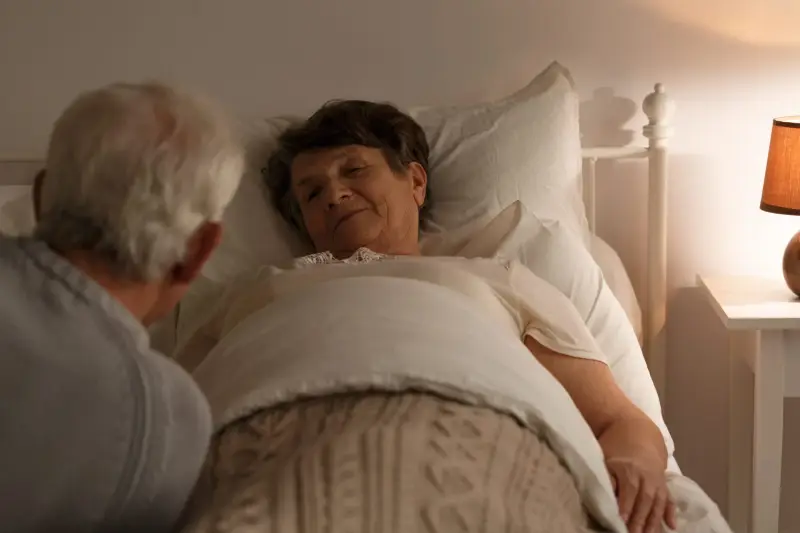
6,000+ Carers
Select from over 6,000 qualified carers
Fast matching
Care can begin in as little as 24 hours
Across Great Britain
We have organised care in every GB postcode
Cost efficient
Costs on average 35% less than traditional services
What is overnight care?
Overnight care is a service where a professional carer stays in a person’s home during the night to provide support and assistance. This allows your loved one to remain safe and secure in the familiar comfort of their own home, providing peace of mind for you and your family.
It’s common for older people to experience disrupted sleep patterns, which can lead to anxiety, confusion, or a risk of falls. This can be caused by natural changes to the body’s circadian rhythm or by conditions such as dementia, where “sundowning” can cause increased disorientation in the evening and night.
By providing dedicated support, overnight care helps to manage these challenges and ensure a safe, restful night. The service can be tailored to specific needs, with options including sleeping care, waking care, and a sitting service.
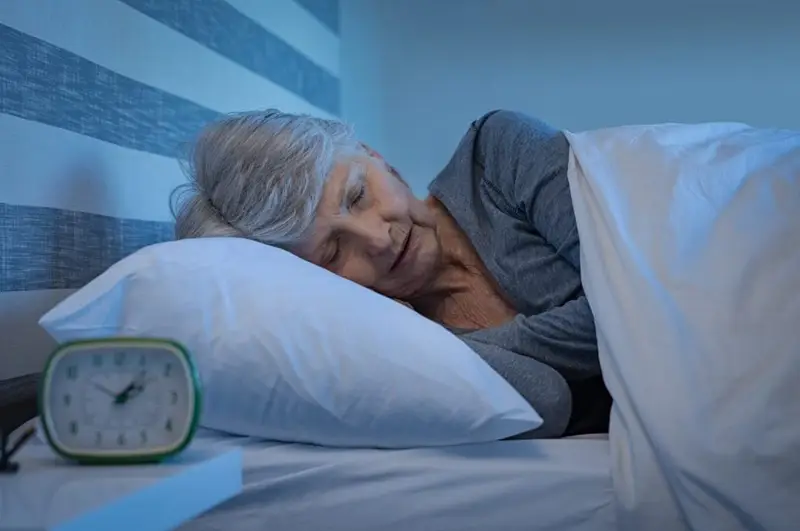
How do I maintain my loved one’s well-being at home?
If you’re worried about your loved one’s sleep or safety at night, the Sleep Foundation offers some recommendations for creating a better nighttime routine. While these tips can help, they also highlight the importance of dedicated support, which is why so many families choose professional overnight care.
- Ensure they’re having enough fresh air and exercise during the day
- Keep a regular sleep schedule – this means going to bed and waking at the same time each day
- Reduce bedroom distractions before bed such as television and bright lights
- Avoid alcohol, caffeine, and large meals late in the day as these may make it harder to sleep
- Keep a landline phone or personal alarm by the bed so they can call for help if they need to.
Why choose overnight care?
Overnight care provides a safety net that protects your loved one during the night, when they may be at their most vulnerable, while also giving you and your family much-needed peace of mind.
The presence of a professional carer throughout the night ensures there is always someone on hand to:

Provide immediate assistance: Whether it’s a fall, a sudden medical need, or simple disorientation, a carer is there to respond swiftly and calmly.
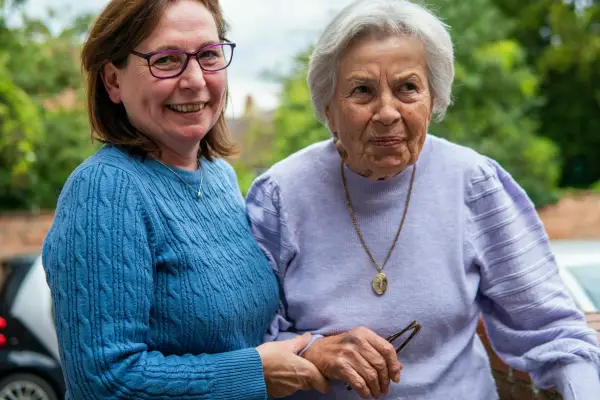
Manage complex needs: For individuals with specific health conditions, such as dementia or Parkinson’s, a carer can provide dedicated, trained support, including administering medication at set times or helping with mobility.
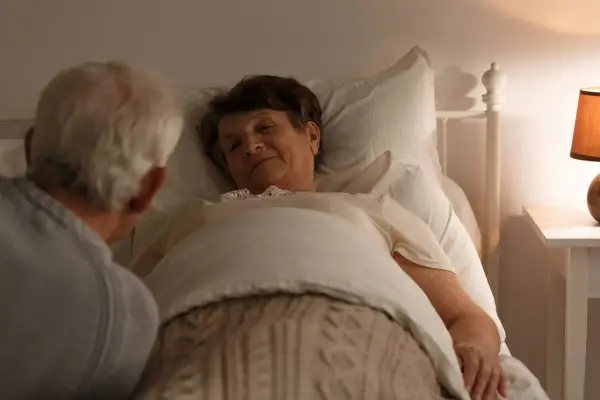
Reduce nighttime anxiety: The simple reassurance of having a trusted person nearby can alleviate feelings of loneliness and fear, helping to promote a better, more restful night’s sleep.
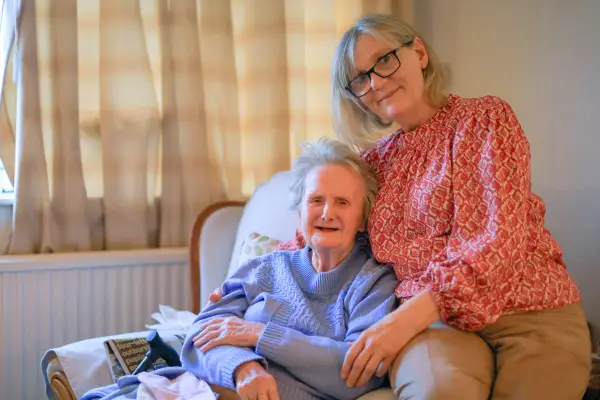
Support personal care needs: A carer can assist with discreet personal tasks, such as toileting or moving in bed, ensuring comfort and dignity are maintained at all times.
What types of overnight care at home are available?
Overnight care can be tailored to your loved one’s specific needs, with options including sleeping care, a sitting service and waking care.
Sleeping night care
In this arrangement, a caregiver will sleep at your loved one’s home. The carer is available for at least eight hours and will sleep in their own room but will be available to help if they are needed. A carer working a sleeping night would not expect to have to get up more than twice.
Waking night care
In this home care option, the carer is on duty for a shift of around ten hours and will not be sleeping. This could be the best option if your loved one needs help several times during the night. For example, they may require assistance with changing position to prevent pressure sores or need medication administered at set times.
A sitting service
This service might be needed if you or another family member provides elderly care during the day but needs a break during the night. A carer would visit for a fixed length of time while the primary caregiver has a break.
How can Elder help with overnight care?
There are three main options for overnight care with Elder:
Live-in care
The carer sleeps at your loved one’s home and gets up a maximum of two times per night. This is included in Elder’s live-in care package.
Overnight care
Overnight care is the primary function of the live-in carer – they’re not available during the day as a 24-hour carer would be.
Two live-in carers
Two carers perform live-in care duties throughout the day and night. This option is ideal if your loved one is awake multiple times overnight.

How do I get overnight care for my elderly relative?
Getting professional overnight care for a loved one is a straightforward process. At Elder, we’ve simplified the journey into three easy steps to help you quickly find the perfect carer.
Share your care request
Tell us your care requirements using our request form, including the type of care you’re looking for, any specialist skills you need, and what daily life looks like.
Select your carer
You’ll start receiving profiles of suitable self-employed carers within 24 hours. Chat to them online or arrange a phone or video call, before choosing who you like best.
Manage care
Once your agreement with your carer begins, use your MyElder account to chat with them and the Elder team, manage your schedule and care information, and find respite cover if you need it.
FAQs about overnight care
Still have questions?
0333 920 3648It's important to monitor your loved one’s sleep habits and nighttime activity. Waking once or twice is normal, but more than that could be a sign professional care is needed. Signs to look for include frequent nighttime wandering, a high risk of falls, or increased confusion and disorientation after dark. Using tools like smartwatches, sleep apps, or motion-sensor cameras (with consent) can help you track these patterns and determine the level of support required.
Sleeping night care involves a carer who sleeps at your loved one’s home and is available to assist up to twice per night. This is suitable for those who need reassurance but minimal physical help. Waking night care involves a carer who is awake and on duty throughout the night to provide frequent assistance, such as with medication or turning over.
Yes, overnight care is often crucial for people with dementia, especially if they experience sundowning or are prone to wandering. A waking night carer can provide constant supervision and reassurance to ensure their safety.
The cost of overnight care varies based on the level of need. Elder provides overnight care as part of a full live-in care package, which starts from £1,150.00 per week and can often be more cost-effective than hiring multiple carers directly.
Yes. Several government schemes can help cover overnight care costs:
- Local authority funding – Based on a care needs assessment and financial eligibility, which vary across the UK.
- NHS Continuing Healthcare – Covers full care costs if your loved one has a primary health need.
- Personal Independence Payment (PIP) – For people under 65 with long-term conditions; not means-tested.
- Attendance Allowance – For those over state pension age needing daily or nightly support; not means-tested.
- Carer’s Allowance – For individuals providing 35+ hours of weekly care.
Navigating care funding can be complex. Speak to a dedicated Care Advisor to find out what support your loved one may be eligible for.
Learn more about our services
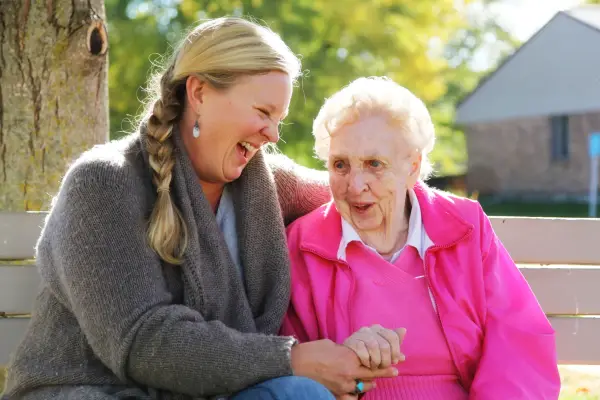
Live-in care
Long-term 24-hour support
- A carer lives in the home to provide round-the-clock support
- Suitable for people living with conditions like dementia, reduced mobility, etc.
- For long-term care needs
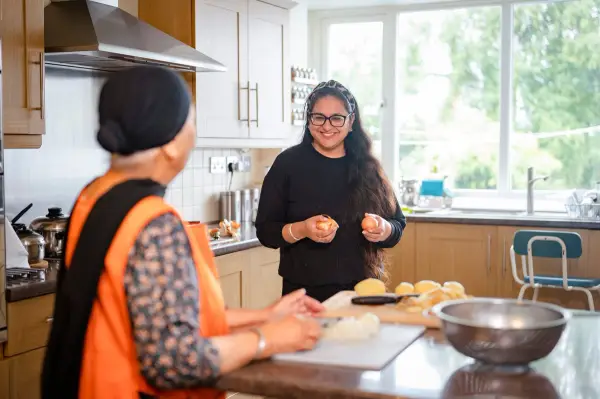
Respite care
Temporary 24-hour support
- A carer moves in for a few days to provide round-the-clock support
- Suitable to cover for a main caregiver or for a temporary increase in care needs
- Minimum duration of 3 days
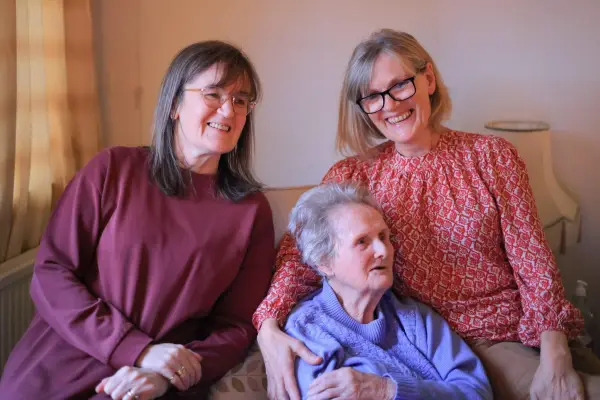
Visiting care
Flexible home visits
- Book as many hours as you need for help in the comfort of your home
- Support with everyday tasks like grooming, walks, cooking, etc.
- From as little as 1 hour per week